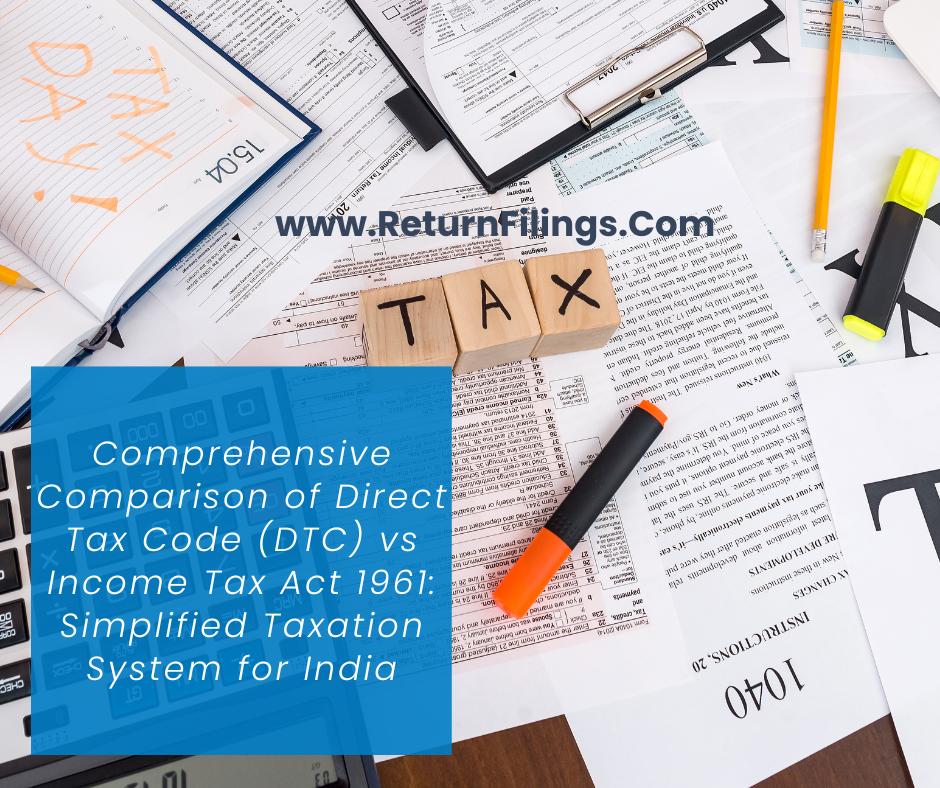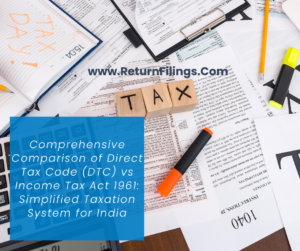The Direct Tax Code (DTC) and the Income Tax Act, 1961 both aim to govern the taxation system in India but differ significantly in terms of structure, objectives, and provisions. Here’s a comparative analysis of both:
1. Purpose and Framework
- Income Tax Act, 1961: Enacted in 1961, it serves as the primary law governing direct taxes in India. Over the years, it has undergone numerous amendments, making it complex and harder to interpret.
- Direct Tax Code (DTC): Proposed as a replacement for the Income Tax Act, the DTC aims to simplify the direct tax laws, reducing ambiguities, and offering a more streamlined approach to taxation. It intends to consolidate multiple provisions under one framework.
2. Simplification of Tax Laws
- Income Tax Act: The Act contains detailed and complex provisions, exemptions, and deductions, leading to a significant compliance burden. Taxation is fragmented with varying interpretations of clauses.
- DTC: The DTC was designed to reduce the complexity by consolidating many provisions, simplifying tax calculations, and removing unnecessary exemptions and deductions. It intends to make tax laws easier to understand and comply with.
3. Tax Rates and Slabs
- Income Tax Act: Different tax slabs for individuals and corporations with many exemptions and deductions. Rates for personal and corporate income vary, leading to different effective tax rates.
- DTC: Proposes broader, simpler tax slabs with fewer exemptions. DTC aims to streamline personal and corporate tax rates, ensuring a more uniform and predictable system.
4. Capital Gains
- Income Tax Act: Divides capital gains into short-term and long-term, with different tax rates and specific exemptions for certain reinvestments (e.g., in property or bonds).
- DTC: Proposes a uniform system for taxing capital gains, simplifying the process by indexing the cost of acquisition and applying taxes based on inflation, removing various complicated exemptions.
5. Corporate Taxation
- Income Tax Act: Varies significantly, with numerous exemptions and deductions. Specific provisions apply for special economic zones, certain industries, etc.
- DTC: Aims to phase out many of these exemptions and introduce a simpler, more uniform corporate tax system with lower tax rates to encourage compliance and economic growth.
6. Exemptions and Deductions
- Income Tax Act: Contains many exemptions under sections like 80C, 80D, etc., making it difficult for taxpayers to compute their tax liability accurately.
- DTC: Seeks to reduce the number of exemptions and deductions significantly. By doing so, it aims to widen the tax base and simplify the tax filing process.
7. Wealth and Dividend Distribution Tax
- Income Tax Act: Previously levied a wealth tax (abolished in 2015) and a Dividend Distribution Tax (DDT), leading to double taxation since dividends were taxed both at the company and shareholder levels.
- DTC: Proposes to eliminate both wealth tax and DDT, ensuring a more straightforward tax system without double taxation issues.
8. Assessment and Dispute Resolution
- Income Tax Act: The assessment and dispute resolution processes are lengthy, with a high volume of pending cases, creating a backlog.
- DTC: Proposes an efficient assessment and dispute resolution mechanism to address disputes quickly, reducing litigation time.
9. Compliance
- Income Tax Act: The complexity of the provisions and the number of filings required make compliance difficult, especially for small businesses and individuals.
- DTC: Focuses on reducing the compliance burden by simplifying filing procedures and improving transparency in the tax administration system.
Summary:
- Income Tax Act, 1961: Known for its complexity due to numerous amendments and provisions, leading to significant compliance burdens and ambiguity.
- Direct Tax Code (DTC): A more modern, streamlined, and simplified approach to taxation, aiming to reduce the complexities of the current tax regime and enhance compliance.
The DTC, although proposed as a reformative solution to the limitations of the Income Tax Act, it is proposed to become an Act in 2025. However, its key features aim to make the tax system more transparent, reduce litigation, and broaden the tax base.






